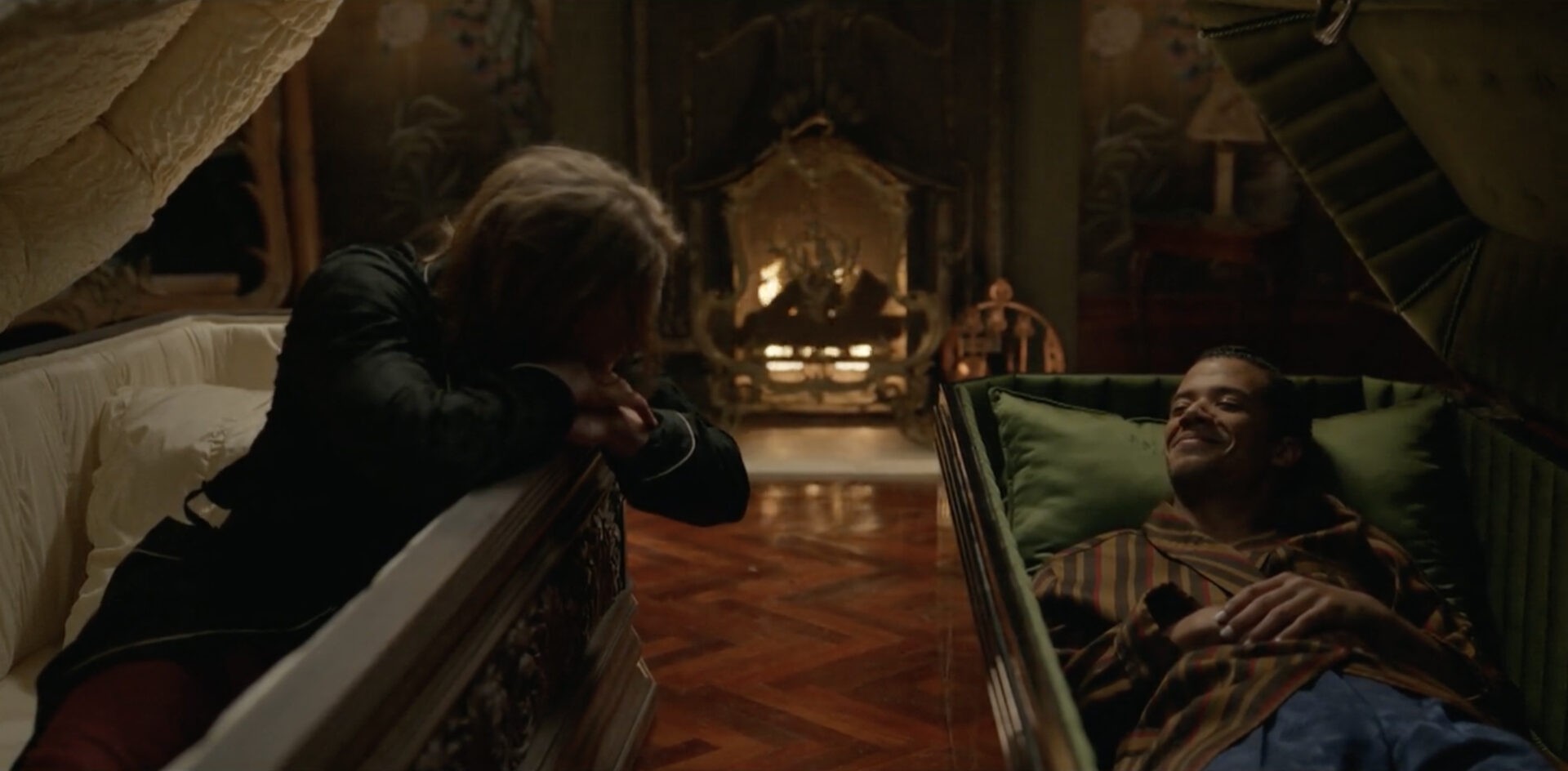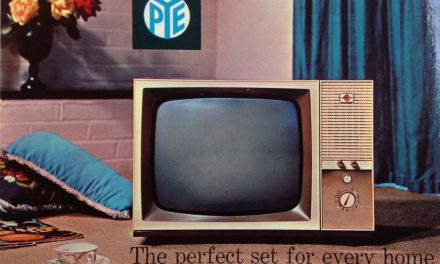The newest adaption of Anne Rice’s novels, Interview with the Vampire (2022), finished airing its season finale in the US on November 13th. It was the most glorious hour of television I’ve experienced in a long time. With stellar sets, costumes, writing, performances, musical score, and everything in between, I’m on the edge of my seat waiting for the next season. Thankfully, AMC confirmed it is airing next year.
It begins with our protagonist, Louis de Pointe du Lac (Jacob Anderson), inviting journalist Daniel Molloy (Eric Bogosian) to redo their interview. Louis claims the story played out differently than the one published in Daniel’s book, the ‘original’ interview of 1976. Louis recounts his short life and eternal death, but Daniel calls his memories into question as the series switches between prolonged flashbacks and present day. In flashbacks, we follow Louis, Lestat (Sam Reid) and Claudia (Bailey Bass) as they ‘endure’ immortality in a beautifully rendered 20th Century New Orleans.
My favourite thing about it, and why I’m here, is that it’s pumping new life into the gothic horror genre. The entire show has this rich texture, a clash of earnest emotional heights and gothic excess. It reminds me somewhat of Penny Dreadful; I was a devoted fan, and still weep daily upon the altar of its cancellation in 2016. In my experience, we are living through a period where everything must be wrapped in ten layers of irony before it can be enjoyed. If you like something “cringe,” or just like it too much, you are doomed to the dunce corner of social media. In a world populated by this kind of thinking, especially among my fellow younger generations, a production that is not afraid to go big and risk exposing itself to ridicule is a breath of fresh air. Jenna Scherer of AV Club calls it “not afraid to have fun,” which sparked this blog. The highs are really high, and it is just too fun to witness.

Fig. 1: Lestat persuades Louis to join him as his companion, to raise him above systematic racial mistreatment and human concerns. It is an incredibly bombastic, moving scene, with thunder and tender violins: “What rage you must feel as you choke on your sorrow.” (E1)
Before her passing, Anne Rice’s ‘willingness to serve as an executive producer and her decision to sell the franchise suggests that she trusted AMC’ to bring the book series to new heights. Her son, Christopher Rice, also signed up to executive produce. The book series is fun, camp, and homoerotically charged; the 1994 film does a decent job at translating that. In her review, Anne thought men and women “are hungry for stylish and profound scenes with beautiful men,” of which she might’ve been proud of this retelling.
The key difference in this adaption lies in the play with metaphor and subtext. The show is not interested in beating around the bush; Lestat penetrates Louis with fangs as they float in the air, writhing, in the very first episode. This is followed by 6 more episodes of kinky libertinism and enough drastic mood swings to put teenagers to shame. The two share blood at a church altar, the priest’s body present, just after Louis’ brother (Steven Norfleet) told him “you should get married next.” (E1). Louis and Lestat function like an old married couple. They whine and moan at each other, wear slippers in their matching coffins, read tall newspapers, and raise sister/daughter Claudia together.
It’s an “open secret”, as the citizens of New Orleans know about the two gentlemen who live together, but never say it outright. Only one is brave enough to ask if they share a bed. For one shining moment, Lestat puts on a Mardi Gras celebration, leading Louis to the dance floor. In the magic of the moment, they both go in for a kiss – in front of everyone! Louis comments to Daniel that the murders they later committed made it into the New Orleans newspapers, but their lip lock did not: “As if the only crime unfit to print took place on that dance floor.” (E8). Their vampire bites can still stand for sex, but it’s preceded and followed by actual sex. Their romantic relationship is laid out on the table to enjoy.

Fig. 2: The two talk in their I Love Lucy dual coffins. “Ridiculous of you to mix human and vampire business,” Lestat warns Louis. “It always ends poorly.” (E2).
In a similar manner, the series adapts Louis’ character differently, drawing conflict from his status as a black man in the early 20th Century. It offers a well of rich, interesting, and occasionally hilarious insights, making this adaption choice the best of the bunch. Once Lestat turns Louis, he may be a vampire, but he has no more power in that regard than he did before: the metaphor is laid aside for a literal interpretation, a dividing line between vampirism and race. “”Exceptional negro,”” Louis bitterly recounts, “”Thank, you sir.”” It was the call and response of my entire life.” Louis’ fangs extend as he strides towards the proprietor who underpaid him: “I had powers now, and decades of rage to process…” (E2). Vampirism is not a metaphor for queerness nor race, because Louis’ tie to humanity is his Creole heritage. He is ostracised because he tries to use his strength – the vehicle of otherness – to fix human problems.
The question naturally arises: Why? What does this do? Well, again, it’s fun! The production can skip around and play with all their dolls in the same episode – even in the same scene. It takes rich source material and provides even more texture. I also think it speaks to contemporary attitudes, a willingness to showcase sexual and racial identities as they are, without needing to use metaphors to keep everyone happy. While a fantastic film, the 1994 adaption shies away from blatant representation. Sam Reid’s Lestat tenderly whispers, “I love you, Louis,” staring straight into his eyes, conjuring tears to mine: “Be my companion.” (E1). Daniel strikingly comments that Louis, in rewriting his history, is trying to convince us he and Lestat were locked in some “fucked up gothic romance.” (E3). It’s startling – exciting. The show itself is rewriting their story.
Charles Bramesco of The Guardian has a middling opinion on Interview with the Vampire taking the risk to make subtextual homoeroticism into text, but the more of the show you see, the better it gets. Things like this are always subjective, too; who is to say which mode of representation is better? You could argue that reading into subtext creates more opportunity for the viewer. But that also means the story misses out on making an impact beyond that. You only have to look at social media to see the show has exploded in popularity. The cast and crew are still giving interviews – most recently a Reddit AMA. I’ve seen more than my fair share of fan videos (my favourite is this one set to ABBA’s Mamma Mia). It’s very telling that LGBT+ and other viewers are celebrating a show willing to give all its characters the ability to speak the truth aloud.
It’s incredibly worthy viewing, and you can see all this for yourself. It’s bringing vampires back from the dead (not sorry). You will revel in the joy of emotional excesses, the vivid expression of a sincere production, of a cast and crew who care deeply about its source – a far cry from the slate of spiteful tailspin adaptions flung at us recently. The show is not currently available on a UK service but will be soon. Join me in some fangy fun when it arrives!
Rebecca Pearce works in university student recruitment. She likes to write about shows she loves to anyone who’ll listen. She is also commencing a Screen Media PhD in 2023.




